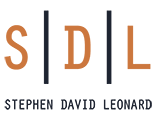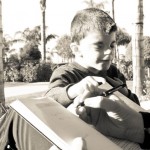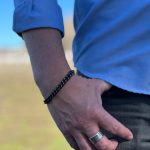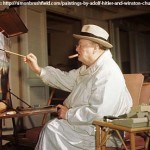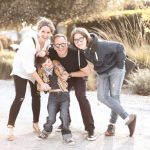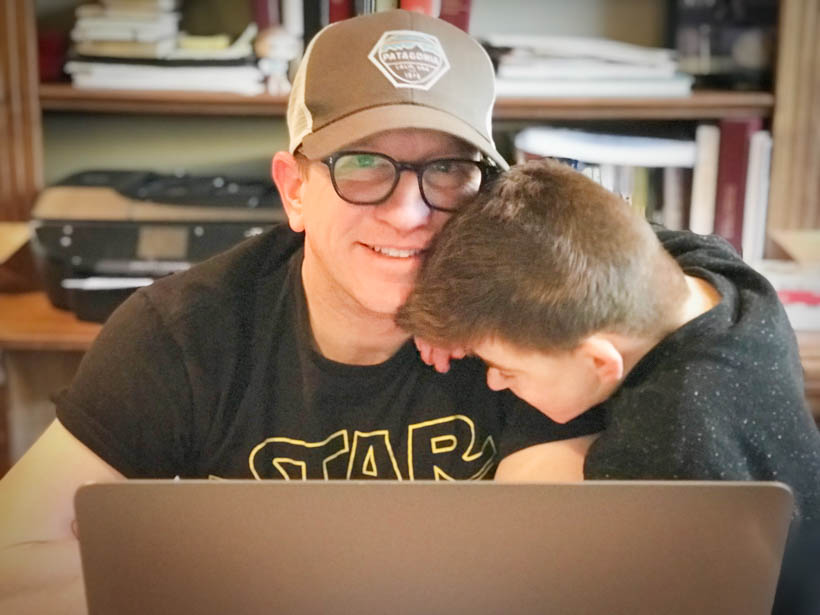 Busy. This word is on my lips everyday lately. Between work commitments and personal commitments this time of year is busy. At work we’re finishing our seasonal busyness, setting annual goals, finishing projects, and doing all the things that go with the end of the year. At home we’re preparing the house for relatives, finishing house projects, parenting, and keeping up with mail, trash and diapers. Sometimes I go from 6am to 7pm, moving from one meeting to the next. Once I get home I fall asleep sitting next to Lisa on the couch at 8, finally falling in bed exhausted. And, all with the feeling of accomplishing little. Busy at work. Busy at home.
Busy. This word is on my lips everyday lately. Between work commitments and personal commitments this time of year is busy. At work we’re finishing our seasonal busyness, setting annual goals, finishing projects, and doing all the things that go with the end of the year. At home we’re preparing the house for relatives, finishing house projects, parenting, and keeping up with mail, trash and diapers. Sometimes I go from 6am to 7pm, moving from one meeting to the next. Once I get home I fall asleep sitting next to Lisa on the couch at 8, finally falling in bed exhausted. And, all with the feeling of accomplishing little. Busy at work. Busy at home.
 If we’re honest, many of us tie our sense of worth to the number of tasks crossed off our lists. It’s easy to judge ourselves and those around us by the number of hours we work and willingness to arrive early and stay late. I see how I sometimes view my work as relating to my worth as a person. I tend to fill my days with bigger projects and more tasks than a person can complete in any reasonable time frame. Meanwhile, I feel guilty about the overwhelming number of commitments I’ve made clawing at my subconscious. In a vicious cycle, I feel worthless for failing to complete the insurmountable tasks I’ve determined justify my existence.
If we’re honest, many of us tie our sense of worth to the number of tasks crossed off our lists. It’s easy to judge ourselves and those around us by the number of hours we work and willingness to arrive early and stay late. I see how I sometimes view my work as relating to my worth as a person. I tend to fill my days with bigger projects and more tasks than a person can complete in any reasonable time frame. Meanwhile, I feel guilty about the overwhelming number of commitments I’ve made clawing at my subconscious. In a vicious cycle, I feel worthless for failing to complete the insurmountable tasks I’ve determined justify my existence.
I just finished reading the book Rest: Why You Get More Done When You Work Less by Alex Soonjung-Kim Pang. The idea that less work might somehow produce better results intrigued me. Pang gathers together in one place the world’s leading research on the critical role of rest on creativity, productivity, and a fulfilling life. Much of what he has to say runs against the way most of us operate. He shows how the most productive, accomplished, world class achievers take mid-day naps, exercise every day, sleep more hours, spent approximately four hours per day on their life’s work for which they’re known and take their evenings, weekends and regular sabbaticals seriously. Pang argues work and rest are not opposed forces, but rather two sides of the accomplishment coin.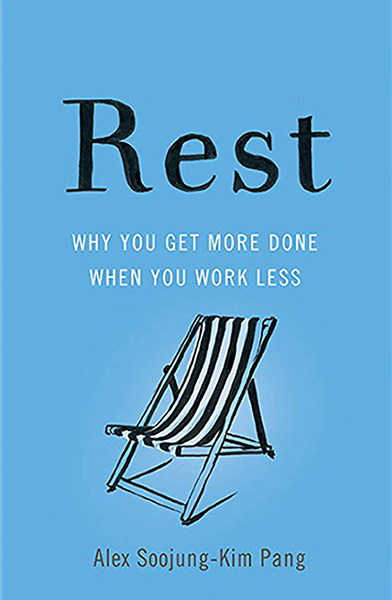 The book is filled with famous examples of people who have taken a rhythm of rest seriously. Charles Darwin woke early, took a walk and ate breakfast, worked 90 minutes, took a break to read mail and write letters, then worked another 90 minutes until noon, at which point he declared, “I’ve done a good day’s work!” In the remaining day he ate two more times, took two more walks, napped, studied for 90 minutes and spent the evening with his family. With this daily routine Darwin went down in history as one of the most productive and famous scientists who ever lived. Winston Churchill and Generals Dwight Eisenhower and Douglas McArthur all took long mid-day naps of 1-2 hours during the height of World War II. C.S. Lewis and J.R.R. Tolkien both rose early, took long walks and afternoon naps, writing early to produce their great literary works. He gives many examples of CEO’s in Silicon Valley, scientists around the world, and others alive today whose lives illustrate major accomplishment and lives filled with waking early, afternoon naps, long walks, intense exercise, intentional vacations and regular sabbaticals.
The book is filled with famous examples of people who have taken a rhythm of rest seriously. Charles Darwin woke early, took a walk and ate breakfast, worked 90 minutes, took a break to read mail and write letters, then worked another 90 minutes until noon, at which point he declared, “I’ve done a good day’s work!” In the remaining day he ate two more times, took two more walks, napped, studied for 90 minutes and spent the evening with his family. With this daily routine Darwin went down in history as one of the most productive and famous scientists who ever lived. Winston Churchill and Generals Dwight Eisenhower and Douglas McArthur all took long mid-day naps of 1-2 hours during the height of World War II. C.S. Lewis and J.R.R. Tolkien both rose early, took long walks and afternoon naps, writing early to produce their great literary works. He gives many examples of CEO’s in Silicon Valley, scientists around the world, and others alive today whose lives illustrate major accomplishment and lives filled with waking early, afternoon naps, long walks, intense exercise, intentional vacations and regular sabbaticals.
Research shows it’s the combination of periods of intense effort and concentration combined with long breaks that has produced the great literary masterpieces, Olympic gold medals, and scientific breakthroughs we all know. The best rest is active and includes a significant dose of strenuous exercise to keep the body and mind fit for work. Rest includes what Pang calls Deep Play—a sport, playing a musical instrument, mountain climbing, writing, art—anything different than your main work requiring effort and skill. And rest includes sleep—lots of it. Over the last few years, thanks to Malcolm Gladwell, it’s become common knowledge mastery comes after 10 years, or 10,000 hours of intentional practice. But, less known, the study producing the 10,000 hour insight also revealed mastery and world class success came after 12,500 hours of deliberate rest and 30,000 of sleep. That’s more than 8 hours a day for 10 years! Deliberate rest stimulate and sustains creativity and problem solving.
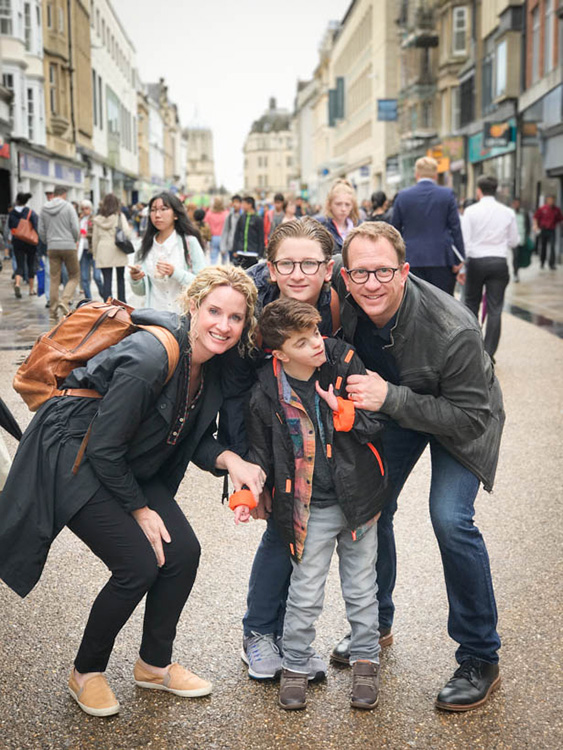 The research surrounding rest is so counter-intuitive and counter-cultural, I have been thinking for days now about the results of a longitudinal study performed by researcher Bernie Eiduson. Eiduson followed top scientists at the beginning of their careers at top universities and tracked the progression of their success over 10 years. Those who published the most and achieved the highest positions, awards, and success all embraced rest and recreation as deeply connected and unified with hard work. In contrast, “Rather than discover the benefits of deep play, the less accomplished members of Eiduson’s cohort assumed that they would do better work by doing more work—and their careers suffered for it.” (220)
The research surrounding rest is so counter-intuitive and counter-cultural, I have been thinking for days now about the results of a longitudinal study performed by researcher Bernie Eiduson. Eiduson followed top scientists at the beginning of their careers at top universities and tracked the progression of their success over 10 years. Those who published the most and achieved the highest positions, awards, and success all embraced rest and recreation as deeply connected and unified with hard work. In contrast, “Rather than discover the benefits of deep play, the less accomplished members of Eiduson’s cohort assumed that they would do better work by doing more work—and their careers suffered for it.” (220)
I am challenged to rethink the pace and schedule of my life. Like many people, I feel a constant need to do and to accomplish. I’m prone to take up the honorable badge of busyness to convince myself and others how successfully my life is going. The research says I have it all wrong. It is those who know how to unplug, pursue hobbies, nap, exercise, enjoy relationships, who not only achieve the most, but experience the fullest lives.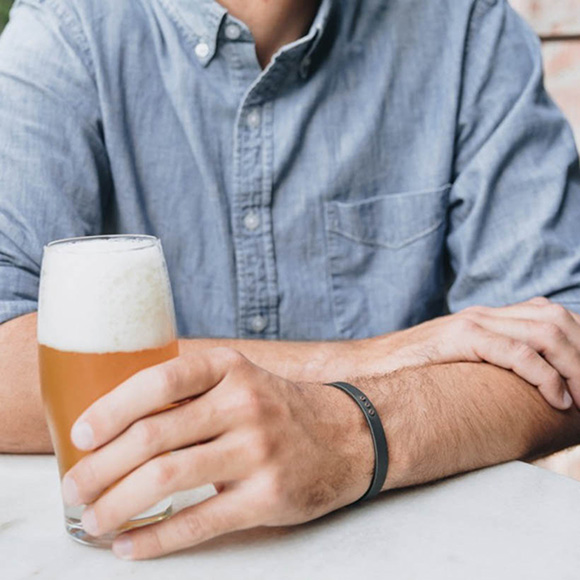 This time of year is a fantastic time to take a moment and reflect on where you’ve been and where you want to go. It’s a time to think about the life you want to live. I am setting aside time in the next few days to set my goals and plan for next year. I want to rearrange my life to nap more, play my bass and guitar more, exercise, spend more intentional time with friends and family and sleep more. I invite you to join me in finding a fuller life through more rest. Succeeding at any goal requires grit and resiliency. The more of us who exchange busy lives for lives filled with rest, the easier it will be. And, the more we can all live lives filled with the things that matter.
This time of year is a fantastic time to take a moment and reflect on where you’ve been and where you want to go. It’s a time to think about the life you want to live. I am setting aside time in the next few days to set my goals and plan for next year. I want to rearrange my life to nap more, play my bass and guitar more, exercise, spend more intentional time with friends and family and sleep more. I invite you to join me in finding a fuller life through more rest. Succeeding at any goal requires grit and resiliency. The more of us who exchange busy lives for lives filled with rest, the easier it will be. And, the more we can all live lives filled with the things that matter.
2000 years ago Jesus offered us the rest we need, “Come to me, all who labor and are heavy laden, and I will give you rest. Take my yoke upon you, and learn from me, for I am gentle and lowly in heart, and you will find rest for your souls.” (Matt. 11:28) Today, scientific research validates ancient wisdom about the nature of being human. May we all find the rest we need and seek.
I would love to hear about you—what do you do to rest?
